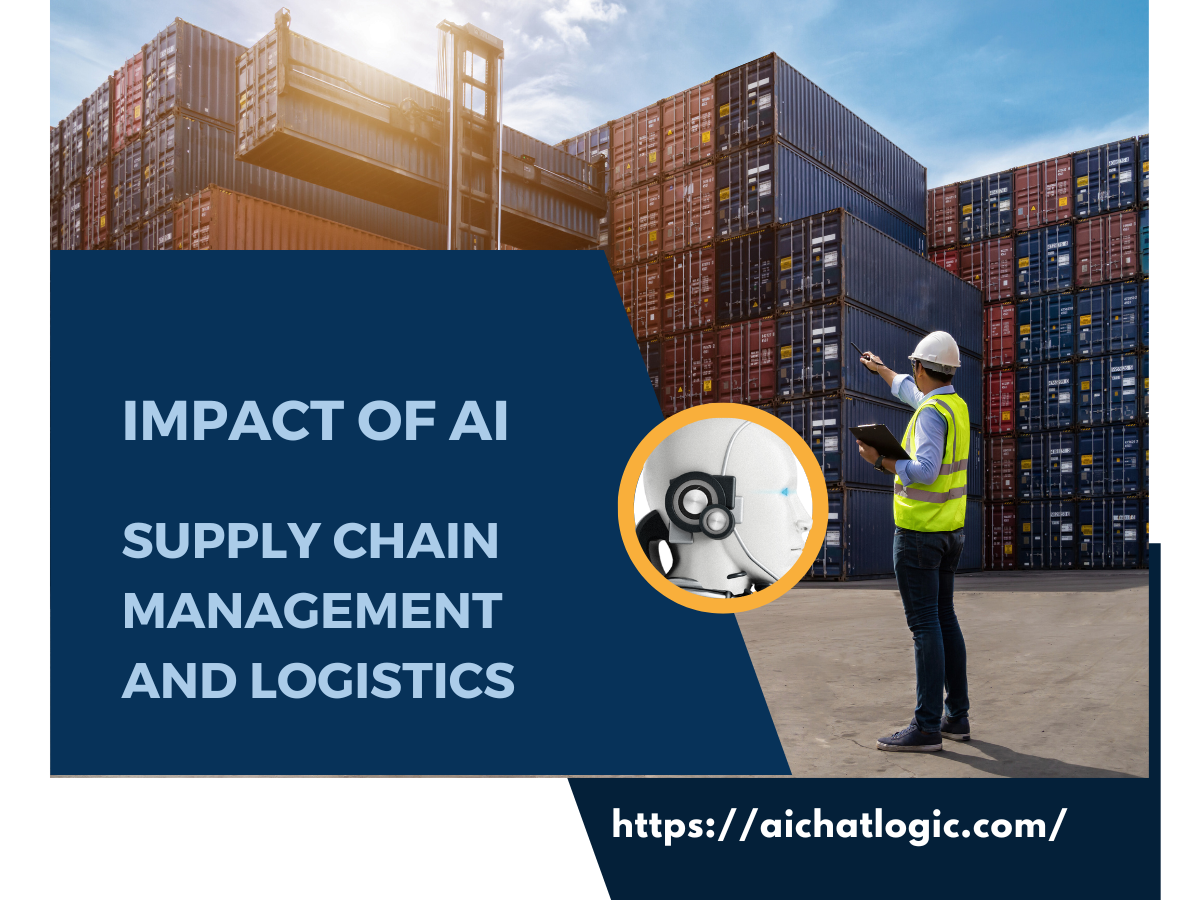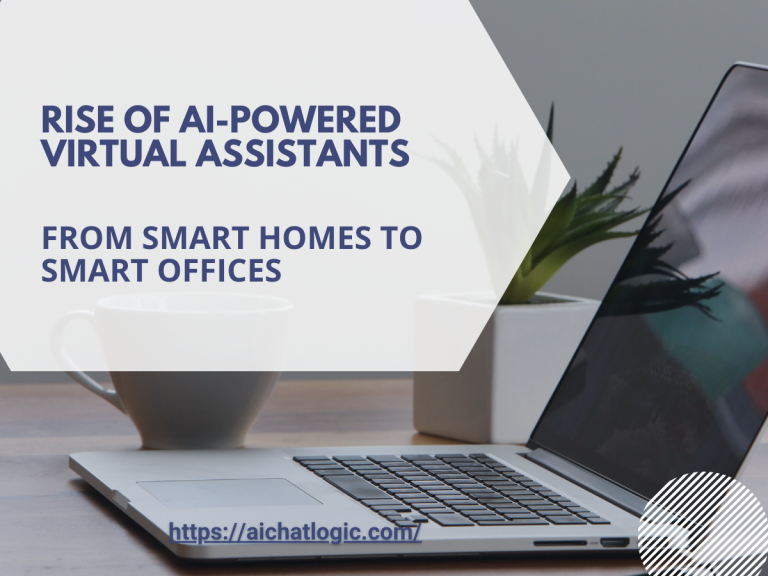1. Introduction:
In recent years, the rapid advancements in artificial intelligence (AI) have had a profound impact on various industries. One sector that has particularly benefited from AI is supply chain management and logistics. AI technologies have revolutionized the way businesses handle their operations, enabling them to streamline processes, improve efficiency, and make data-driven decisions. From demand forecasting and inventory management to warehouse operations and transportation logistics, AI has become a game-changer for businesses seeking to optimize their supply chain operations.
2. How AI is Transforming Supply Chain Management
2.1 Improved Demand Forecasting with AI
Accurate demand forecasting is crucial for supply chain management, as it helps businesses optimize their inventory levels, minimize stockouts, and reduce costs. AI-powered algorithms analyze large volumes of historical data, customer behavior patterns, market trends, and external factors to generate highly accurate demand forecasts. This allows businesses to make informed decisions regarding production, procurement, and inventory management, ensuring that they can meet customer demands while avoiding excess inventory or shortages.
2.2 Enhanced Inventory Management and Optimization
Efficient inventory management is essential for maintaining a healthy supply chain. AI algorithms can analyze historical sales data, seasonality, market trends, and other variables to optimize inventory levels and reduce carrying costs. By dynamically adjusting reorder points, safety stock levels, and lead times, AI systems can ensure optimal stock availability while minimizing the risk of overstocking or stockouts. This improves operational efficiency, customer satisfaction, and ultimately, the bottom line.
2.3 Streamlined Warehouse Operations through AI
AI technologies have significantly transformed warehouse operations, making them more efficient and accurate. AI-powered systems can automate repetitive tasks such as sorting, picking, and packing, reducing human errors and increasing productivity. Furthermore, AI-enabled robotics can work alongside human workers, assisting them in physically demanding tasks and improving overall efficiency. AI-driven warehouse management systems also provide real-time visibility into inventory levels, location tracking, and order fulfillment, enabling businesses to optimize their warehouse operations and deliver products faster.
2.4 Efficient Route Planning and Transportation Management
Transportation logistics is a critical aspect of supply chain management, and AI has proven to be invaluable in this area. AI algorithms analyze various data points, including traffic patterns, weather conditions, delivery locations, and vehicle capacities to optimize route planning and load allocation. By finding the most efficient routes and reducing empty miles, businesses can minimize fuel consumption, lower transportation costs, and improve overall delivery performance. Additionally, AI-powered tracking systems provide real-time visibility into shipments, allowing businesses to proactively address any issues and enhance customer satisfaction.
3. AI-Enabled Automation in Logistics
3.1 Autonomous Vehicles and Drones Revolutionizing Delivery
Autonomous vehicles and drones are transforming the last-mile delivery process. AI-powered self-driving vehicles can navigate roads, follow traffic regulations, and make deliveries without human intervention. This technology not only reduces delivery costs but also enhances efficiency and speed. Drones, on the other hand, can reach remote or hard-to-access areas, delivering packages quickly and efficiently. These advancements in autonomous delivery systems have the potential to revolutionize the logistics industry, improving delivery times and reducing reliance on human labor.
3.2 Robotics and AI in Warehousing and Sorting
AI-driven robotics systems have made significant strides in automating warehouse operations. Robots equipped with AI algorithms can efficiently navigate warehouses, locate items, and transport goods, reducing manual labor and increasing productivity. AI-powered sorting systems can quickly categorize and organize products based on predefined criteria, optimizing order fulfillment and minimizing errors. The integration of AI and robotics in logistics operations not only enhances efficiency but also improves safety by reducing the risk of accidents and injuries.
4. AI-driven Data Analytics for Supply Chain Optimization
4.1 Real-time Tracking and Visibility of Goods
AI-powered tracking systems enable businesses to have real-time visibility into the movement of goods throughout the supply chain. By leveraging technologies such as RFID tags, sensors, and GPS, businesses can track shipments, monitor inventory levels, and identify potential bottlenecks. This real-time data allows for proactive decision-making, enabling businesses to address issues promptly, optimize routes, and ensure on-time deliveries. Improved visibility and transparency in the supply chain lead to better customer service and increased operational efficiency.
4.2 Predictive Maintenance for Equipment and Vehicles
Unplanned equipment downtime can severely impact supply chain operations. AI-driven predictive maintenance systems use sensor data, machine learning, and historical maintenance records to predict equipment failures before they occur. By identifying potential issues in advance, businesses can schedule maintenance activities proactively, minimizing disruptions and improving overall equipment reliability. This reduces downtime, extends the lifespan of assets, and enhances operational efficiency in the supply chain.
4.3 Intelligent Risk Management and Mitigation
AI-powered analytics enable businesses to identify and mitigate risks in the supply chain. By analyzing historical data, market trends, and external factors, AI algorithms can assess potential risks and provide insights for proactive risk management. Businesses can anticipate disruptions, such as natural disasters or supplier issues, and develop contingency plans to minimize their impact. This proactive risk management approach helps businesses maintain operational continuity, reduce losses, and enhance overall resilience.
5. Overcoming Challenges and Maximizing Benefits
5.1 Integration of AI with Existing Systems and Processes
Integrating AI into existing supply chain systems and processes can present challenges. Businesses need to ensure compatibility between AI solutions and legacy systems, as well as address any data integration issues. This requires careful planning, collaboration with technology providers, and thorough testing to ensure a smooth implementation. However, the benefits of AI integration, such as improved efficiency and decision-making, far outweigh the challenges.
5.2 Addressing Data Privacy and Security Concerns
As AI relies on vast amounts of data, data privacy and security are significant concerns. Businesses must implement robust data protection measures, including encryption, access controls, and secure data storage, to safeguard sensitive information. Compliance with data privacy regulations, such as GDPR or CCPA, is crucial to maintaining customer trust. By prioritizing data privacy and security, businesses can leverage AI while ensuring the confidentiality and integrity of their supply chain data.
5.3 Training and Upskilling the Workforce for AI Adoption
The integration of AI in supply chain management and logistics requires a skilled workforce capable of leveraging AI technologies. Businesses should invest in training programs to educate employees about AI concepts, tools, and applications relevant to their roles. Upskilling the workforce ensures that employees can effectively collaborate with AI systems, interpret insights generated by AI algorithms, and make informed decisions. By empowering the workforce with AI skills, businesses can unlock the full potential of AI in their supply chain operations.
6. FAQs on AI in Supply Chain Management and Logistics
6.1 How does AI improve demand forecasting in supply chain management?
AI improves demand forecasting by analyzing historical data, market trends, and customer behavior patterns. This enables businesses to generate accurate demand forecasts, optimize inventory levels, and improve overall supply chain efficiency.
6.2 What benefits does AI offer in warehouse operations?
AI offers several benefits in warehouse operations, including automation of repetitive tasks, enhanced picking and packing accuracy, real-time visibility into inventory, and optimization of warehouse layouts for improved efficiency.
6.3 How can AI-powered analytics enhance supply chain visibility?
AI-powered analytics enable real-time tracking of goods, providing businesses with visibility into inventory levels, shipment statuses, and potential bottlenecks. This visibility helps optimize supply chain operations and enhances customer satisfaction.
6.4 What challenges are associated with integrating AI in existing systems?
Integrating AI in existing systems can be challenging due to compatibility issues, data integration complexities, and the need for thorough testing. However, careful planning and collaboration with technology providers can help overcome these challenges.
6.5 How does AI impact the workforce in supply chain management?
AI impacts the workforce by automating repetitive tasks, augmenting human capabilities, and requiring employees to develop AI-related skills. Upskilling the workforce is essential to leverage AI effectively and ensure successful adoption in supply chain management.
7. Conclusion:
The integration of AI in supply chain management and logistics is transforming the industry, offering numerous benefits and optimization opportunities. From demand forecasting and inventory management to warehouse operations and transportation logistics, AI-driven technologies are revolutionizing the way businesses operate. By embracing AI, businesses can enhance efficiency, improve decision-making, and gain a competitive edge in the rapidly evolving global marketplace. As AI continues to advance, it is imperative for businesses to leverage its capabilities and adapt to the evolving landscape to build smarter and more efficient supply chains.












+ There are no comments
Add yours